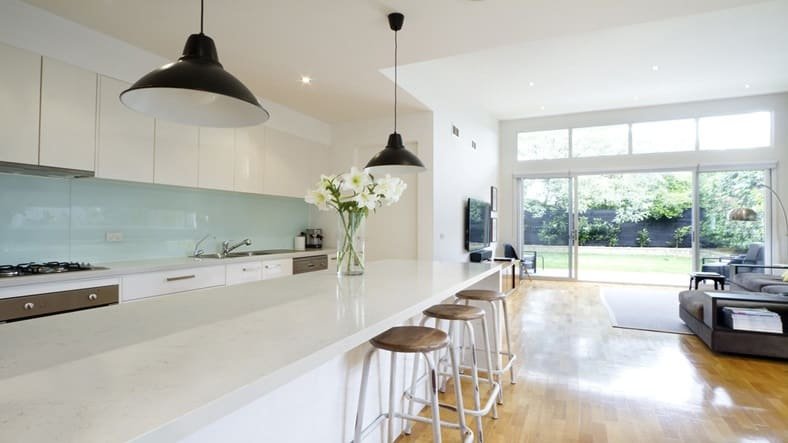Why Choose Elegant Limestone Kitchen Worktops? Pros and Cons

What Are Limestone Kitchen Worktops?
Limestone is a natural stone formed from compacted sediment over millions of years. Its unique textures and subtle color variations, such as beige, cream, and soft grey, bring a natural elegance to any space.
Key Features of Limestone:
- Natural Aesthetics: The stone’s organic veining and neutral tones make it a favorite for contemporary and minimalist designs.
- Formation: Composed of calcite and other minerals, limestone is durable yet softer than granite or quartz.
- Popularity: Limestone is a go-to material for modern kitchens, blending seamlessly with sleek cabinetry and metal fixtures.
The Pros of Limestone Worktops
Elegant Appearance
Limestone Kitchen Worktops offers a luxurious, timeless aesthetic that enhances the look of modern kitchens. Its neutral tones and soft patterns create a sophisticated yet understated vibe, making it suitable for various design styles.
Natural Durability
While softer than granite or quartz, limestone is durable when properly maintained. Its heat-resistant nature makes it a functional choice for kitchens, as it can handle hot pans and dishes without damage.
Eco-Friendly
Limestone is a sustainable material with a lower environmental footprint compared to synthetic alternatives. Its natural composition and availability make it an environmentally responsible choice for eco-conscious homeowners.
Versatility in Design
Limestone’s versatility allows it to complement both contemporary and traditional kitchen designs. It pairs beautifully with wood, metal, and painted cabinetry, offering endless design possibilities.
The Cons of Limestone Kitchen Worktops
Porosity Issues
One of limestone’s biggest drawbacks is its porosity. Without proper sealing, it’s prone to staining from spills like wine, oil, or coffee. Regular resealing is necessary to keep it looking pristine.
Scratch and Chip Risks
Limestone is softer than materials like granite and quartz, making it more susceptible to scratches and chips. Heavy impacts or sharp objects can damage the surface.
Cost Factor
While limestone is more affordable than marble, its upfront costs are higher compared to materials like laminate or wood. Professional sealing and installation also add to the expense.
Sensitive to Acids
Limestone reacts to acidic substances like vinegar, lemon juice, or even certain cleaning products, which can cause etching. Immediate cleanup of spills is essential to prevent damage.
How to Maintain Limestone Worktops
Proper care and maintenance can significantly extend the life of limestone kitchen worktops. Follow these tips to keep your surfaces looking their best:
- Sealing: Apply a high-quality sealant during installation and reseal annually to protect against stains and moisture.
- Daily Cleaning: Use a soft cloth with warm water and a pH-neutral cleaner to avoid damaging the surface.
- Avoid Abrasives: Steer clear of abrasive scrubbers or acidic cleaners, as these can scratch or etch the stone.
- Repair Options: Minor scratches or chips can often be repaired with a professional polishing or stone repair kit.
Alternatives to Limestone Worktops
If you’re considering other options, here’s how limestone compares to popular alternatives:
| Feature | Limestone | Granite | Quartz | Marble |
|---|---|---|---|---|
| Durability | Moderate | High | Very High | Moderate |
| Maintenance | High | Medium | Low | High |
| Appearance | Natural, Soft | Bold, Varied | Customizable | Luxurious |
| Cost | Moderate | High | Medium-High | High |
- Granite: Extremely durable but lacks the subtle warmth of limestone.
- Quartz: Non-porous and low maintenance, but lacks the natural appeal of limestone.
- Marble: Stunningly beautiful but requires even more upkeep than limestone.
Conclusion
Limestone Kitchen worktops for modern kitchens offer a unique blend of natural beauty, versatility, and eco-friendliness. While they require more maintenance than some alternatives, their timeless elegance and ability to complement a variety of kitchen styles make them a worthwhile investment. By understanding the pros, cons, and care requirements, you can determine if limestone is the perfect fit for your kitchen.
If you’re exploring options for your next kitchen renovation, limestone worktops might be just what you need to create a modern, sophisticated space. Contact us today for expert advice and installation services.
FAQs About Limestone Worktops
1. Is Limestone Suitable for Kitchen Countertops?
Yes, limestone is suitable for kitchen countertops, offering a timeless and elegant appearance. However, it requires proper sealing and maintenance due to its porous nature. Regular care helps prevent stains and scratches, making it a viable choice for many kitchens.
2. Why Isn’t Limestone More Commonly Used in Kitchens?
Limestone isn’t as common in kitchens because it is softer and more porous than materials like granite or quartz. These characteristics make it prone to staining, etching, and scratches, requiring more maintenance to keep it in pristine condition.
3. Can You Install Limestone for Kitchen Worktops?
Limestone can be used for kitchen worktops, but it’s best suited for kitchens with lighter use. Sealing is essential to protect against stains and moisture. With proper care, limestone worktops can provide a stunning and durable solution.
4. What’s the Best Stone for Kitchen Countertops?
Quartz is often considered the best stone for kitchen countertops due to its durability, low maintenance, and variety of designs. Granite is another great option for its natural look and strength, while limestone is ideal for elegant, low-traffic kitchens.
5. How Does Limestone Compare to Granite for Kitchen Worktops?
Granite is harder and more durable than limestone, making it more resistant to scratches and impacts. Limestone offers a softer, more refined look but requires sealing and careful maintenance, unlike granite, which is more robust for heavy use.
6. Is Limestone a Cost-Effective Option for Kitchen Countertops?
Limestone is moderately priced, typically less expensive than marble but costlier than laminate or wood. While initial costs are reasonable, maintenance expenses, such as sealing and repairs, should be factored in for long-term budgeting.
7. Can Limestone Worktops Withstand Heat?
Yes, limestone is heat-resistant and can handle moderate exposure to hot pans or dishes. However, using trivets or heat pads is recommended to prevent thermal shock or discoloration, ensuring the surface remains in top condition.
8. What Are the Common Maintenance Challenges with Limestone Worktops?
Limestone is prone to staining, etching, and scratching if not properly sealed or maintained. Regular resealing, gentle cleaning with pH-neutral products, and avoiding acidic substances are essential to keeping limestone worktops in good condition.
